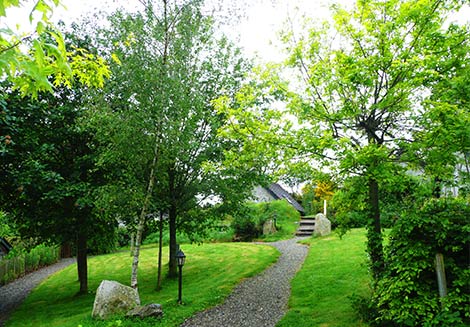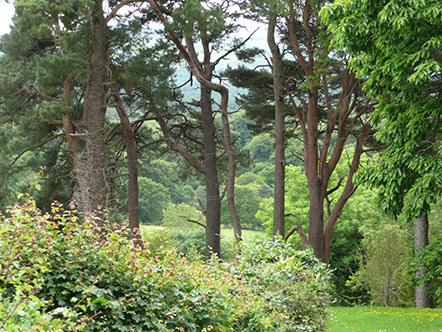For those who have not spent time in solitude before, the following guidelines might be helpful:
Give yourself time to arrive. It can sometimes take time to ‘land.’ Your mind may be busy with thoughts and worries from where you’ve come. It can also take a while to adjust to unfamiliar surroundings especially if you have not been on a solitary retreat before. You may find that you are tired to the point of exhaustion and just need to sleep. Take time to do what you need to do. There is no rush. You are here and this is holy ground. Whatever you need to do is enough.

Look around and take in your surroundings. Drink in the beauty and peace of nature. Allow yourself to notice small things – the green of a leaf, the graceful bend of a tree, the shape of clouds. Let the song of the birds fall upon your ear. This is your space – make yourself at home in it.
Look around your hermitage also and take time to settle in. Arrange things as you want them and make yourself comfortable. For the next few days, this is your kingdom – the cave into which you make your retreat from the world, the nest from which you take flight again back, refreshed, to what you have left.

Silence is not the absence of sound. It is rather a quality of listening. It can be disconcerting to find that the silence expected in a hermitage is actually filled with sounds – the singing of birds, the barking of a dog, the sighing of the wind through the trees. There can be other sounds too – the banging of a door, a voice heard in the distance, the hum of a fridge, the annoying tick of a clock.
As you settle into the silence, you become aware of sounds like these. Sometimes it can feel as if they are disturbing the silence. Take time to become aware of these sounds and welcome them. Integrate them into your silence. Notice how they arise and fall away. Allow them to come and go. You are the still pond in which sounds pass through like ripples. They do not take away from the silence; they are part of it.
Take time to listen. This is why you have come. If you listen, you will hear what you have been called into the silence to hear. You will hear what you need to hear – now, at this time, in this place. The voice which speaks the truth you need to hear is already there within you. It may be soft and gentle, barely a whisper; it may be loud and urgent, not to be ignored. Take time to listen to this voice. It is the voice of your deepest self and it will speak to your hopes and dreams and sorrows. It will bring healing and peace, joy and inspiration. It will guide you towards the Ultimate Mystery. It will show you the path you must walk. Listen to this voice. Listen with the ear of your heart. Listen.
As you listen, you will become more present. You will begin to inhabit more fully each moment as it passes. A quality of mindfulness will develop where you begin to pay more attention to what is happening here now. This is a gradual process that takes place over time so do not be dismayed if you cannot sense it happening straight away. Little by little, you will become more deeply present – to your surroundings, to the people you meet, to yourself and ultimately to the One who is always present, to Eternal Presence itself. Let yourself become anchored in this presence so that, as things arise and pass away, you will not be disturbed but will continue to simply be present to what happens as it happens. Soon you will realize that this simple being present is always enough.

It can sometimes be helpful to have a focus for the practice of listening and being present. We choose a focus and place our attention upon it. When the mind wanders (as it inevitably does – sometimes every few seconds), we notice that it has wandered and bring it gently back to the focal point. We do this again and again, as often as is necessary. This helps to steady and quieten the mind.
Any number of things could be chosen as a focus: a candle or an icon; the breath as it enters and leaves our body; the body itself and its sensations; the silent repetition of a sacred word or mantra. It is not important what is chosen; what is important is to keep bringing the mind back to this focus when it wanders.
Do not scold yourself if your mind wanders. It is only to be expected (for advanced practitioners as well as beginners). Distraction is part of spiritual life. All that is required is that, when you notice the mind has wandered, you bring it gently back. This constant noticing and bringing back is what meditation consists of.
Movement is an integral part of any period of solitude. It is impossible (and unhealthy) to spend the entire time sitting still. Exercise and fresh air are very beneficial and, in such beautiful surroundings, it is good to get out for a walk if possible.
Movement can be integrated easily into one’s practice. Simply pay attention to the sensation of movement itself, to the feelings in your body as you walk, to the sights and sounds and smells all around you. This can help to deepen the quality of your listening. It can also engender a joyful awareness of being alive and part of the interconnectedness of all things.
Carrying out any chores in your hermitage (cooking, washing dishes, etc.) can also be integrated into your practice. Simply attend to what you are doing as you are doing it. Thich Nhat Hanh has a saying, “You can wash the dishes in order to have clean dishes or you can wash the dishes in order to wash the dishes.” Washing dishes is not simply a chore to be got out of the way: it is another opportunity for the practice of mindfulness, listening, being present.
While you are in solitude, it is best not to overload the mind with information or news. This allows the mind to empty itself of much of the unnecessary information with which it has become cluttered and to process what really needs to be dealt with. It is this ‘de-cluttering’ which allows the mind to quieten and eventually come to rest.
For this reason, it is best to keep reading to a minimum and to avoid radio, TV and the internet altogether. As far as possible, avoid use of your mobile phone. On the other hand, mindful meditative reading of scripture or poetry can be conducive to the process of listening. A little spiritual reading can also be helpful but it is good to remember that less is more. A little reading followed by reflection is better than trying to cram in a lot.
As you spend time in solitude, you will start to notice much about yourself and your experience that had escaped your notice before. Thoughts, feelings, ideas, bodily sensations will all start coming to the surface and clamouring for your attention. This can feel overwhelming or confusing at first.
Try not to identify with what comes up in your experience – whether positive or negative. As far as possible, let your thoughts and feelings come and go – without trying to hold onto them and without trying to push them away. Simply become aware of them. Acknowledge the effect they are having on you. Try not to judge them.
It is good to bring an attitude of curiosity and exploration to this inner activity. You may like to gently enquire of your experience: what is this thing and how did it get here? Notice how thoughts and feelings arise and pass away. Where possible, let them go. Ifthis is not possible, simply notice that you have become attached and let them be. Do not try to fight them. Be open to what they may have to teach you and know that they will change of their own accord when the time is right.
It is extremely important to be gentle with yourself as you engage in the practice of solitude. Sometimes the thoughts and feelings which come to the surface are disturbing. One can feel overwhelmed by negative feelings or ‘stuck’ in old patterns of thought or behaviour. It is easy to become frustrated or depressed at an apparent lack of progress.
Whatever your experience, hold it gently and be kind to yourself. Try not to judge yourself. Remember, we are all imperfect and much of spiritual growth is concerned with becoming aware of our flaws and accepting them. We are all in need of mercy in some way and it is this very need that opens us up to the grace of the Transcendent. As St. Paul says, it is “when I am weak, then I am strong.” (2 Cor 12:10)
Do not be afraid to accept your weaknesses. We all have them and we are all struggling with the human condition one way or another. The more we are kind and compassionate with ourselves, the more we will be kind and compassionate to others.

This being human is a guest house.
Every morning a new arrival.
A joy, a depression, a meanness,
some momentary awareness comes
as an unexpected visitor.
Welcome and entertain them all!
Even if they’re a crowd of sorrows,
who violently sweep your house
empty of its furniture,
still, treat each guest honorably.
He may be clearing you out
for some new delight.
The dark thought, the shame, the malice,
meet them at the door laughing,
and invite them in.
Be grateful for whoever comes,
because each has been sent
as a guide from beyond.
~ Rumi ~

A common mistake made by those new to the practice of solitude is to try too hard. It is necessary to strike a healthy balance between having a little structure and discipline to your days and pushing yourself too hard. Too much effort produces a striving energy which gets in the way of the open and relaxed state of mind which makes it possible to listen and to be present. Go easy on yourself. If you need to sleep, sleep. If you need to relax, relax. Listen to your body and what it needs. Trust that each moment contains all it needs for your spiritual growth. And don’t be afraid to laugh at yourself now and then.
Keep in mind also that being in solitude is not easy. If this is your first experience, you may find that a little is enough. You may even find that you need to leave before you had planned to. Do not be hard on yourself if this happens. Your inner being knows what is right for you and knows if it is good for you to be in solitude or not. Listen to your inner being. If you need to leave, leave. Know that this too is okay. Remember there are many different ways to pray and right now solitude may simply not be the way for you.

If you begin to experience negative feelings, you may wish to look for spiritual support, particularly if this is your first experience of solitude. Spiritual support generally consists of talking over what is going on with someone experienced in the area of spiritual accompaniment. However overwhelming or difficult one’s experience may be, it almost always helps to talk to someone who listens without judging and accepts you as you are.
Spiritual companions will not be able to provide easy or instant answers; but they may ask questions or provide guidance that helps one to articulate one’s experience and to become clearer about the issues involved. Above all, simply talking to another person breaks down any feelings of isolation that may be developing and gives one a sense of companionship on the journey.
Going for refuge to the truth of one’s faith is probably the most important support of all. When things get difficult and particularly if you begin to doubt yourself, you will need to return to the core of your faith, to that which prompted you to start out on this path in the first place.
This faith will differ from person to person. Christians might remember that we are loved by God. Buddhists might recall our ability to grow and develop and ultimately reach Enlightenment. In each case, going for refuge means trusting in one’s goodness as a human being, believing that one can change for the better and standing firm in the truth that it is meaningful and worthwhile to engage in this process.
It is our faith and the truth it embodies which helps us to stay with the process of being in solitude and to cope with whatever difficulties arise. By returning to the core of what gives us refuge, we remember that “all shall be well, all shall be well and all manner of thing shall be well.” (Julian of Norwich)
When the period of solitude is over, it will be necessary to return to the world. This is not always easy. Sometimes the noise and ‘busyness’ of life can be jarring after the experience of silence. Sometimes, one’s expectations can be too high and can lead to disappointment.
Again, be gentle with yourself. Acknowledge the impact of what is happening to you and try to be present to it. It may help to set aside some time each day to practise the quiet listening you experienced in your time of solitude. Remember that change is difficult and takes time and patience. Do not try to force anything and do not give yourself a hard time if you are not able to do what you hoped. Do what you can and be kind to yourself. As far as possible, bring that kindness into the dealings you have with people around you. The journey of St. Kevin was from solitude to community. Any authentic experience of solitude will bear fruit in greater kindness and compassion in our lives.
Finally, remember the solitude is always here – waiting for you. Sometimes we need to return to solitude to refresh ourselves so we can turn again to the tasks we face in the world, renewed by the gifts and peace we have found.
Farewell pilgrim! Go in peace. Shalom.
